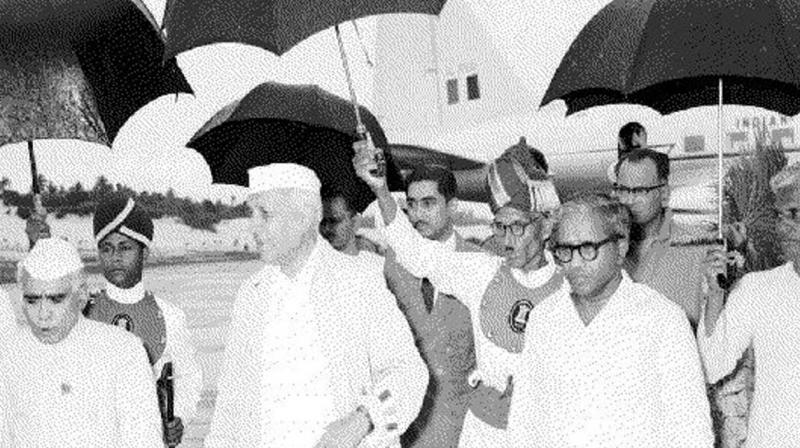Blame it on naivety of EMS ministry: M G S Narayanan

Post-Independence, Congress fortunes waned as it lost touch with the masses, paving the way for Communists to come to power. Many prominent Congress leaders quit active politics within 10 years of Independence. Old guards, including K. Kelappan, the Kerala Gandhi, E. Moidu Moulavi, Abdurahiman Sahib and K.P. Kesava Menon, gave up party activities. Kelappan launched another party and aligned with Communists, whom he had criticized all along. Kesava Menon went back to edit Mathrubhumi. Moidu Moulavi was sidelined and silenced. But Communists maintained lively contact with the people, engaged and lectured to them in study classes and meetings. Communists wooed intellectuals and won over many to their side. This paid off electorally. The first Communist ministry assumed office through the ballot in 1957 with E.M.S. Namboodiripad at the helm.
However, the Communist theory and praxis, propounded by Karl Marx, was not adaptive to parliamentary democracy. In the early 19th century there was no parliamentary democracy. Even in Great Britain, the concept evolved later. The suffrage was restricted to the privileged in the salad days of democracy. So when Communists took over and started to rule, they found themselves in alien waters.
Their outlook, practice and experience were far remote from assumptions and conventions of parliamentary democracy. Even the Opposition, in a minority in the legislature, has to be respected. But Communists thought the Opposition had to be suppressed. The phase witnessed ‘Cell Rule’ under which Communist party cells at various forums decided the course of governance. So the Opposition called it a ‘cell government’.
One of the first objectives of Namboodiripad ministry was education and land reforms. Education minister Joseph Mundassery had scores to settle with the Catholic Church. The educational terrain in the 1950s was dominated by private managements. The trend was set by Christians and later picked up by Nair Service Society. Mundassery wanted to take away rights of private managements and the government had the support of private college teachers, who were exploited by dishonest managements in term of salaries and service conditions. Mundassery and Communists tried to control private college managements by whittling down their power of appointment and transferring it to the government, impliedly the party. This made Catholics and Nairs join hands and the education bill proved a catalyst in their faceoff with the Government.
Communists held education was a government subject, not to be left to whims of community managements. But the fact was that all these educational institutions were built up over long years with the capital, hard work and organized leadership of private managements. Are they to be deprived of their natural right? This was the question. They said it was injustice to take away their rights and warned it would upset the atmosphere in educational institutions. The anger and resentment crystallised into an anti-Government struggle. A long charge sheet was prepared and publicly presented and accepted at meetings. A section of people even demanded the Centre to oust the government, for which there was a provision in the Constitution.
Prime Minister Jawaharlal Nehru was against ousting the elected government. It was technically right but politically wrong. Nehru arrived in Kerala and on his way from airport, accompanied by E.M.S Naboodiripad, saw thousands of people shouting slogans against EMS. “How did you manage to make so many thousands hostile to you in such a short period of time?” Nehru asked EMS.
Later Indira Gandhi, elected Congress president, insisted on dismissing the ministry. I personally feel it was not so undemocratic. In fact liberation struggle saved Kerala as it proved to be a corrective factor. Leaders’ inexperience and the lack of education among commissars contributed to the fall of the EMS ministry.
But Communists were undemocratic even from the beginning. First generation leaders like P. Krishna Pillai, A.K. Gopalan, K. Damodaran and EMS were almost Gandhians. But the next generation succumbed to power. Communists were after absolute power. Absolute power corrupts absolutely. This eroded the ideological core and discipline of Communist parties. Marxist theorist Rosa Luxemburg had predicted it years ago.
I feel communitarianism is not as bad as Communism. Much of the development in Kerala owes to community leaders. It was Sree Narayana Guru, hailing from the Ezhava community, who brought progressive changes in the community. Mannathu Padmanabhan, besides his overall leadership, worked for Nair progress. V T Bhattathiripad worked to modernize Namboothiris. Muslim leaders also worked for the community. All progress among masses was led by community leaders. Communists paid lip service. But community leaders have to be criticized, their policies have to be modified and corrected. In Kerala because of these changes and alternating electoral successes, the people grew in political awareness. More people were drawn to political activity. This is certainly a gain of the system. Congressmen or Communists, under constant public pressure, responded in varying measures to popular demands. That is how united Kerala reached where it is today.
(As told to Jose Kurian)
(The author is a historian, academic and a former Chairman of the Indian Council of Historical Research.)

